

My Problem With School Student Voice. Repost from Huffington Press Education.
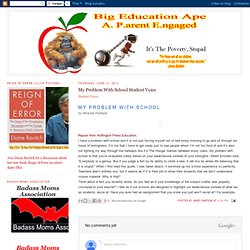
I have a problem with school and it is not just forcing myself out of bed every morning to go and sit through six hours of boringness. It’s not that I have to get ready just to see people whom I’m not too fond of and it’s also not fighting my way through the hallways like it’s The Hunger Games between every class. My problem with school is that you’re evaluated solely based on your weaknesses instead of your strengths. Albert Einstein said, “Everybody is a genius. This Teacher Teaches Amazing Lessons, Even When She Isn't In Front Of A Classroom. KIDS PHILOSOPHY SLAM: Home. Harriet Sanford: Want to Improve Teaching? Listen to Students. Annie Emerson doesn't have to wonder about what it takes to help her kindergarten students learn how to write or do math.
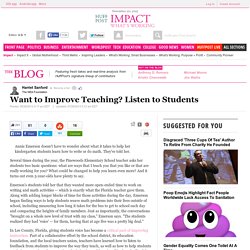
They've told her. Several times during the year, the Pinewoods Elementary School teacher asks her students two basic questions: what are ways that I teach you that you like or that are really working for you? What could be changed to help you learn even more? A Curriculum of Concerns. Image credit: iStockphoto Most excellent teachers have learned what first-rate filmmakers have always known, that to be successful you need to reach your audience emotionally.
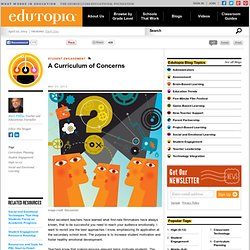
I want to revisit one the best approaches I know, emphasizing its application at the secondary school level. The purpose is to increase student motivation and foster healthy emotional development. Teachers know that making lessons relevant helps motivate students. The most frequent approach is to link curriculum to learner interests. But two educators, Mario Fantini and Gerry Weinstein, in two now out-of-print books, Making Urban Schools Work and Towards Humanistic Education, pointed out that it would be more effective to link curriculum to the concerns of learners.
City of Philadelphia Youth Commission. Students rally for schools, shut down traffic. The committee heard four hours of testimony from critics and supporters, who agreed that time was running out on the School District.
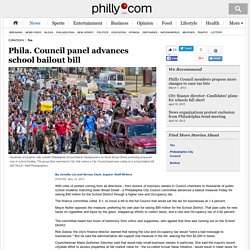
SLA Media. Zahon Matthews: Straight talk. My English teacher from last year referred me to Mighty Post and I believe I’m right for the job.
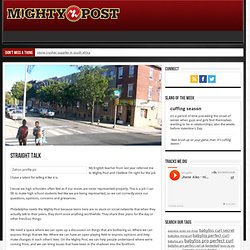
I have a talent for telling it like it is. I know we high schoolers often feel as if our voices are never represented properly. This is a job I can fill: to make high school students feel like we are being represented, so we can correctly voice our questions, opinions, concerns and grievances. Philadelphia needs the Mighty Post because teens here are so stuck on social networks that when they actually talk to their peers, they don’t voice anything worthwhile.
They share their plans for the day or other frivolous things. We need a space where we can open up a discussion on things that are bothering us. Philadelphia is full of teens. On the Mighty Post, we can comment on the ridiculous, the funny and the necessary. Sugata Mitra: The child-driven education. TEDx coming to a Bucks school. Posted: Thursday, May 9, 2013, 4:56 PM TEDx, the grassroots-level version of the wildly popular TED Conferences (where speakers deliver presentations on phenomena like body language or lasers that fight malaria), is coming to Solebury School in New Hope on Sunday.
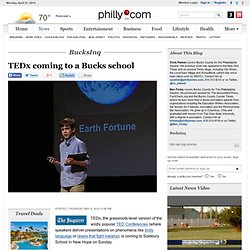
From 9:00 a.m. until 3:00 p.m., students from Solebury and surrounding high schools - including Central Bucks East and Moorestown Friends - will deliver talks on a variety of topics, from "Unacknowledged Women in History," to "After the Track: Second Careers for Thoroughbread Racehorses. " (The full program is below.) While TED conferences feature prominent speakers, such as Bono and Google co-founder Sergey Brin, TEDx events are designed to be similar in the sense that they offer unique, mind-stretching presentations, but they are organized by local groups. Videos of TEDx speeches are often re-watched online; some of the most viewed TEDx talks have received upwards of 10 million views. Student Voices on Opting-Out. Last month I had the great opportunity to speak on a Save Our Schools webinar, “Elevating Student Voices: Sparking the Movement for Our Future.”
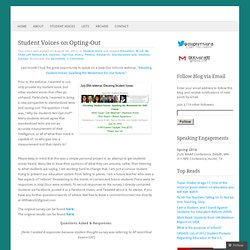
Prior to the webinar, I wanted to not only provide my student voice, but other student voices that often go unheard. Particularly, I wanted to bring a new perspective to standardized tests and opting-out. The question I had was, “Why Do Students Not Opt Out?” Many students would agree that standardized tests are not an accurate measurement of their intelligence, or all of what their mind is capable of, so why give into a measurement tool that claims to? Please keep in mind that this was a simple personal project in an attempt to get students’ voices heard. The original survey can be found here.The original results can be found here. Questions Asked & Responses: [Note: I voided 4 responses because student thought survey was referring to AP tests\Final Exams\SAT] Student perspectives on school improvement. Student Perspectives on School Improvement John Beresford Paper presented at the British Educational Research Association Conference, Cardiff University, September 7-10 2000 Abstract This article traces the development of the Student Conditions instrument, and briefly conceptualises each condition, using a combination of a review of the literature and findings from empirical research from within IQEA.
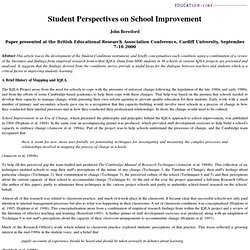
Data from 6000 students in 36 schools in various IQEA projects are presented and analysed. It suggests that the findings derived from the conditions survey provide a useful focus for the dialogue between teachers and students which is a critical factor in improving students' learning. SIG Formation Petition: Student Participation, Voice, and Partnership SIG Survey. Become an inaugural member of the Student Participation, Voice, and Partnership SIG.

The Student Participation, Voice, and Partnership SIG would provide a space to share research in which students share their opinions of problems and potential solutions, collaborate with teachers and administrators, and/or taking the lead on making change in their schools and communities. Taking as foundational the right of students to play an active role in analyzing and shaping their educational experiences, the SIG would unify research that explores this commitment under a range of headings, including student voice, youth-adult partnerships, child rights, youth participatory action research, students as change agents, and related fields. Currently, this work does not have a home in one place at AERA but is instead scattered across several divisions and several SIGS. Please indicate your interest by completing the following survey and forwarding to your friends. A middle school student’s version of a New York State Assessment.
Yesterday, I took the final part of the eighth grade test.
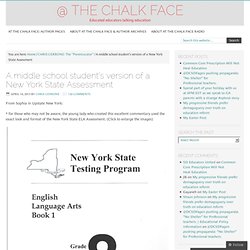
The aftermath goes as follows for a class where everyone is in at least one advanced class and gets grades usually above 90: Book 1- One student did not complete this book & a few had to rush. Personally, I had enough time to go back over about half the test.